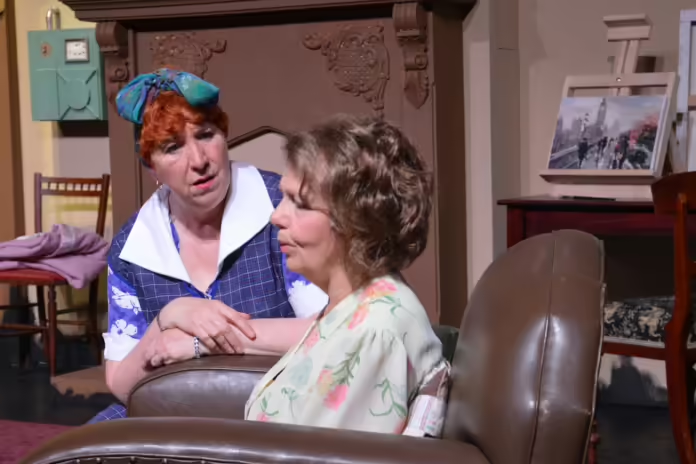First performed over seventy years ago in 1952, British playwright Terence Rattigan’s “The Deep Blue Sea” has been highly praised and described as “…the greatest of British mid-twentieth-century drama” with “ …one of the most complicated, flawed and fascinating female roles at its centre.” At its core it explores matters of the heart and sexuality in a profoundly class-structured British society in which responses to issues like unfaithfulness in marriage, suicide, stepping outside of one’s ‘natural’ social status, and homosexuality depend on perspective defined by gender and class. The Deep Blue Sea is a drama of ‘manners’, and its success turns on how well the cliched characteristics of class are presented. Independent Theatre’s production goes part way to achieving this, but the contrasts are not as stark as they need to be.
The central character of the play is Hester Collyer. She is trapped in a passionate but destructive affair with a younger man, and struggles with despair after abandoning her husband. Her search for both physical and emotional love, and freedom, clashes with societal expectations, which leads to a devastating confrontation between personal desire and the harshness of reality.
Lyn Wilson as Hester gives a solid performance, and her scenes with Patrick Marlin (Freddie Page, the younger man) are intense and expose Hester’s essential fragility and her struggle to match it with a man who is effectively not her equal. Hester’s husband, Sir William Collyer (played by Chris Bleby) is at the opposite end of the social scale, and she struggles to complement him as well, but this doesn’t effectively come across. Bleby might have played the role with a grander spectacle of upper class ‘manners’ and emotional restraint in order to give Wilson something more idiosyncratic to react against, and, importantly, to draw a greater contrast with Freddie who actually came across as Collyer’s social ‘equal’ on occasions. To a contemporary Australian audience who might not be attuned to the social mores of a class-conscious Britain from a time well past, the contrasts are perhaps the necessary signposts to guide them through the plot and the psyches of the characters.
Marlin’s Freddie comes across as confused with his current station in life, about which he is resentful and at times angry. Marlin effectively signals his dissatisfaction with his relationship with Hester, and we see how it leads to a rapid deterioration with his other friendships. Ryan Kennealy and Tim Everson, as Philip Welch and Jackie Jackson respectively, play two such acquaintances and give sustained well-crafted characterisations. The audience develop a mix of sympathy and displeasure for both characters, as they unintentionally stack the deck against Hester. Freddie appears to have manipulative influence over both of them, and Marlin develops this well, although one might have enjoyed a differentiated approach by Freddie to achieving this in appreciation that Welch and Jackson also inhabit differing social standings. Sophie Livingston-Pearce plays Anne Welch, the young wife of Philip, with urgent youthfulness and heightened curiosity about how the upper class conduct their lives and try to sail through their shortcomings.
IT stalwart and veteran David Roach plays Mr Miller, a former doctor who has been struck off the medical register. The reasons for his defrocking are only hinted at and never stated explicitly, but one assumes from the quaint language used by Mrs Elton (played stylishly by Rose Vallen), the landlord of the tenement that Hester and Freddy rent, that Miller was found guilty of being a homosexual, which was illegal at the time and solid grounds to render him morally and ethically unsuitable to be a doctor. Wisely, director Rob Croser chooses not to require Roach to play the role with cliché affectations, but rather to play it ‘straight’. To do otherwise would have the potential to diminish Rattigan’s text and to intrude unwelcome, inappropriate and distracting ‘humour’. Rather, Roach’s Miller comes across as decent, caring and empathetic, and a buoy that Hester can clutch onto in moments of extreme need. Roach’s performance was a gentle highlight of the production.
Designed by David Roach, the set comprises the living room of Hester and Freddie’s flat. A curtained archway leads to an unseen kitchen, and another door leads to an unseen bedroom. The front door to the flat is imposingly oversized and leads to a visible landing. The furnishings are tasteful and of ‘the period’, but perhaps a little too tasteful for the reduced circumstances under which Hester and Freddie live. The visible gas meter (in which a shilling needs to be periodically deposited) would seem to suggest the essentially modest nature of the tenement. Isaac Horsfall-Sutton’s lighting design is effective and evokes a lower-middle-class area of London.
IT’s production of The Deep Blue Sea is done well enough, but creaks under the weight of an ageing script whose themes are less significant today than they were three generations ago, and likely better served up with much stronger contrasts and with more direct language for today’s audience.



